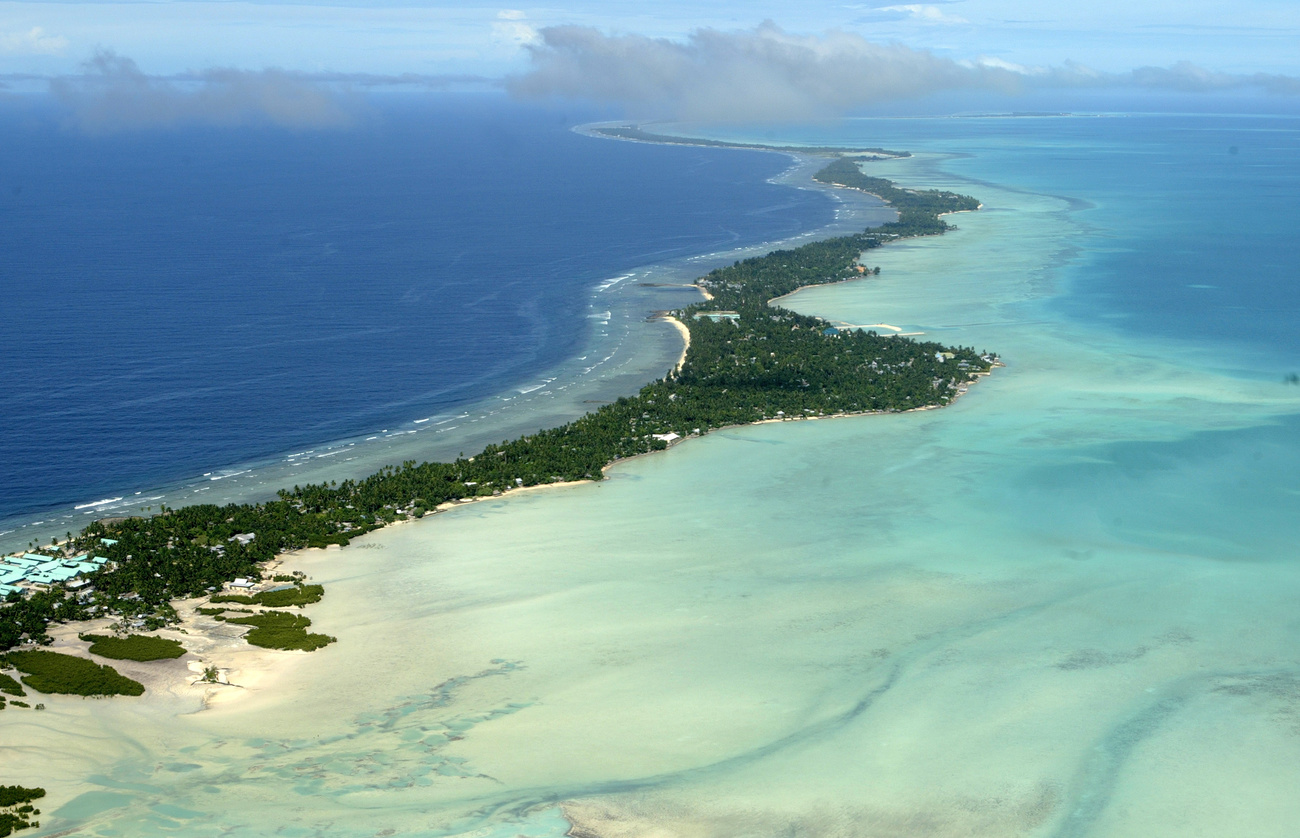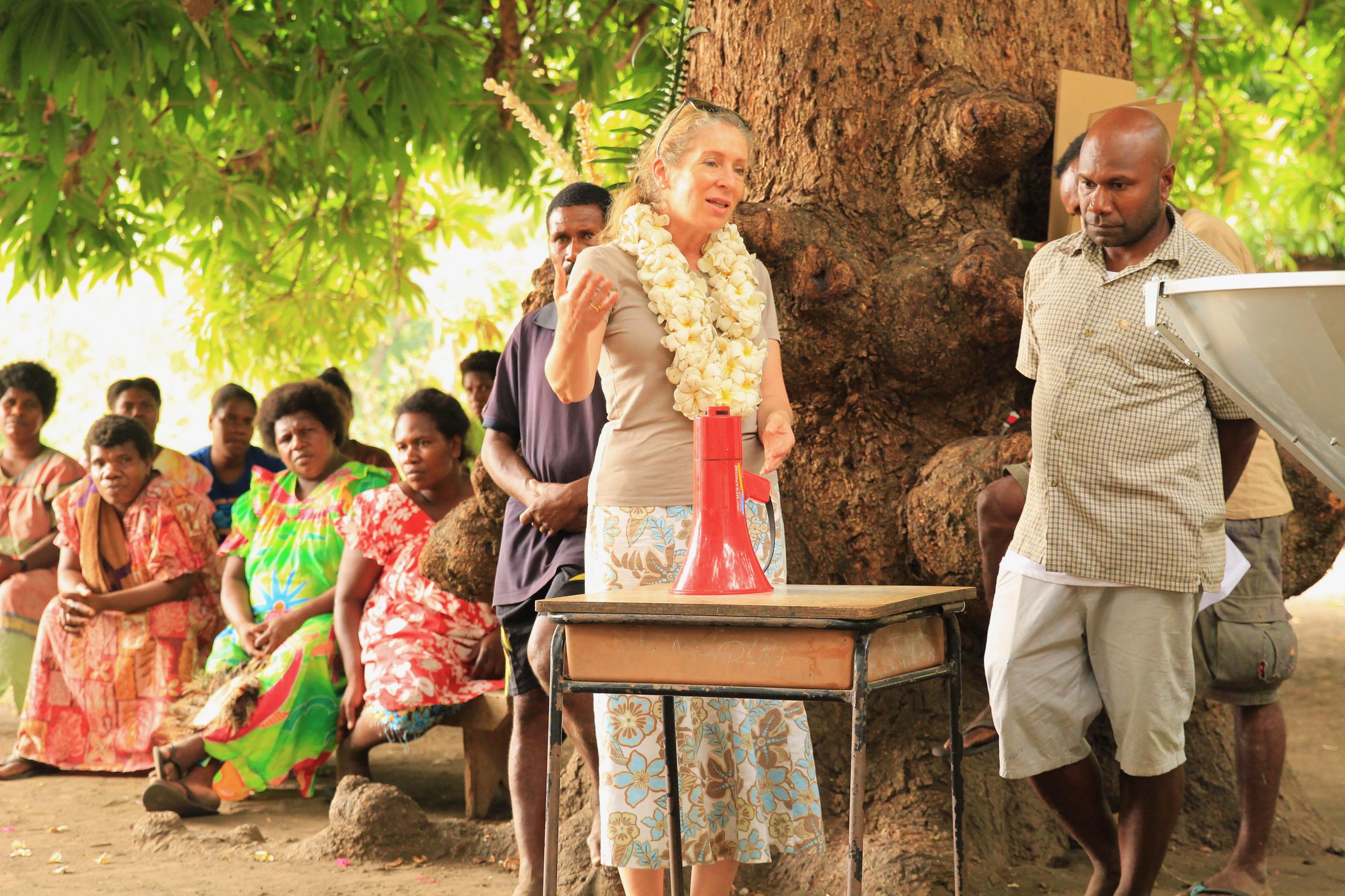
‘The world is discovering the Pacific’

SWI swissinfo.ch talks to Yasmine Chatila Zwahlen, the Swiss ambassdor to Kiribati, Nauru, Papua New Guinea, the Solomon Islands and Vanuatu about Switzerland’s growing role in the Pacific and why the region will become increasingly important on the world stage.
Swiss diplomat Yasmine Chatila Zwahlen (born 1963) observes events in the Pacific based in the Australian capital Canberra – not just as special envoy for the region, but also as ambassador to Kiribati, Nauru, Papua New Guinea, the Solomon Islands and Vanuatu. She job-shares the head of mission role in Canberra with her husband, the Swiss ambassador to Australia, Pedro Zwahlen.
Yasmine Chatila comes from a Swiss-Lebanese family and spent her earliest years in Lebanon. When the civil war started there in 1975 the family moved to Switzerland, where her grand-parents were already living. After taking a degree at the University of Bern, she embarked on a diplomatic career in 1994 with the Swiss foreign ministry. She had assignments in Development and Cooperation in Bern, in the Swiss embassy in Cairo, in the foreign policy planning group, as a ministry spokesperson, as head of the ministry’s information service in Geneva, as deputy head of mission at the Swiss embassy in Damascus, Syria, and in the same function in Lisbon, Portugal.
She job-shared the roles in Damascus und Lisbon with her husband. After an assignment at the foreign ministry’s head office in Bern in the field of scientific diplomacy, she became Swiss ambassador to Costa Rica in 2012. Then in 2017 she became head of mission in Canberra in a job-sharing arrangement with her husband Pedro Zwahlen. The couple have a daughter and a son.
SWI swissinfo.ch: Switzerland is getting increasingly involved in the Pacific. Can you explain this shift in diplomacy?
Yasmine Chatila Zwahlen: Swiss foreign policy is universal. We represent our values throughout the world. We aim to have good relations with all states. Bilateral and multilateral, but also regional. Regions of the world like the Pacific play an increasingly important role in the solution of global problems. For Switzerland, increasing involvement means, to begin with, getting to know a huge region, where for historical reasons the country has not had intensive contacts.
SWI: The Pacific covers a third of the earth, but the region is almost unknown to many Swiss people. Is it of real political significance for Switzerland?
Y.C.Z.: There are a total of 22 states and territories in the Pacific. 12 of these states are members of the United Nations. This accounts for 6.22 percent of the votes at the UN. We cannot just ignore these countries; we want to work with them in dealing with global challenges. The most important regional organisation, the Pacific Island Forum (PIF), has been in existence since 1971. The PIF has 18 full members, including Australia and New Zealand. There are other members who do not have a vote at the UN, like the Cook Islands, French Polynesia and New Caledonia, though that might change.
SWI: The small Pacific states are – economically anyway – not that small, when you add them up. How are we to interpret the fact that we are talking here about a land area of no more than 500,000 square km, but an exclusive economic zone of 40 million square km?
Y.C.Z.: In the last few years in the Pacific there has been a change in self-perception. The countries now see themselves not just as small island states, but as “big ocean states”. They know that their major share of ownership in the ocean gives them an importance and a certain amount of power. They are severely affected by a number of global problems – especially the consequences of climate change – but they also have massive economic resources.
SWI: In recent years China has been steadily building its profile in the Pacific. How important geopolitically and strategically is this region?
Y.C.Z.: The Pacific Ocean covers a third of the earth’s surface, so control of this area is of great importance for international trade, food security, as well as military rivalry between the great powers. Until recently, China and Taiwan divided up political relations with the island states between them just about evenly. But China’s influence is now growing rapidly due to a strategic investment approach. The importance of the Pacific is increasing in other ways too – you might even say that the world is now discovering the Pacific. Switzerland is one of many countries – European ones included – that is paying more attention to relations with states in the region.

SWI: What is Switzerland’s focus in the region?
Y.C.Z.: The Pacific is not a priority for the Swiss Development and Cooperation Agency. For us political relations are the main priority.
It has come to our attention that the Pacific in the past carried relatively little weight in international institutions. We have invited 16 states – about half of them in the Pacific – to open a permanent mission in Geneva, which with the UN and 35 other international institutions is a location of global importance. We are doing this on the one hand to boost the international status of Geneva, and to have all the states in the world represented there. On the other hand, we are hoping that these Pacific states will be able to take a role for themselves on the world stage. They need political friends to do it, and that is what we are.
SWI: To go back to local aid – how much is Switzerland spending in the Pacific?
Y.C.Z.: In the past four years it was CHF 700,000 per year for projects, on average. Part of the money comes from the humanitarian aid budget of the Development and Cooperation Agency, and part from the political directorate. As I said: this region is not a particular focus for development aid from Switzerland, but our global programmes and values are at work there too.
SWI: The federal government’s new strategy of international cooperation links development aid to Switzerland’s long-term interests. One of these is climate change. Is the fight against the consequences of global warming a focus of your work in the Pacific?
Y.C.Z.: The effects of climate change come into just about every aspect of our cooperative work. We work in this field bilaterally with other countries, but also with regional and international organisations. In Vanuatu for example after a disastrous drought we implemented a project that was aimed at helping the population to better resist such disasters. This includes what is being called “climate adaptation“. Agricultural methods need to be adapted to the changing climate conditions – diversifying crops, or making water supply more secure. At the same time we are helping governments strengthen resources in their ministries so that they will be able to deal with future challenges.
SWI: Climate change in the Pacific is also forcing migration. Due to rising sea levels, people are losing their land, the basis of their existence. They have to go elsewhere to survive. Is that an issue for Switzerland ?
Y.C.Z.: Definitely. It is a niche for us. For years we have been providing support to states dealing with these migration flows. If they are not planned for and happen chaotically, they can lead to conflict, to fights over resources. In 2013 together with Norway we implemented what is called the Nansen Initiative. This pinpointed situations where people are fleeing not from war (which would give them protection under the refugee convention) but from the results of climate change. When we started these discussions in the Pacific, it was more or less a taboo topic. People’s sense of belonging to their homeland, to their particular island is sacred. Switzerland stands at the head of worldwide efforts to deal with migration due to climate change.


In compliance with the JTI standards
More: SWI swissinfo.ch certified by the Journalism Trust Initiative






























You can find an overview of ongoing debates with our journalists here . Please join us!
If you want to start a conversation about a topic raised in this article or want to report factual errors, email us at english@swissinfo.ch.